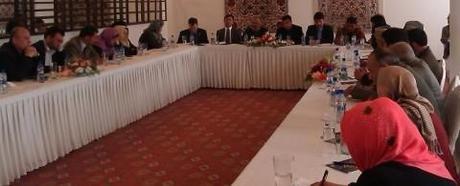
The inaugural meeting of Afghanistan’s Parliamentary Business Caucus
By CIPE Kabul Staff
On November 16, CIPE capped off over two years of work by organizing the inaugural meeting of Afghanistan’s Parliamentary Business Caucus. This new body will be a platform to focus on economic policymaking, promoting investment, creating jobs and promoting the rule of law and good governance in the country. The meeting, held at the Serena Hotel in Kabul, brought together 18 Members of Parliament (MPs) and eight representatives of leading business associations to discuss issues of concern to the business community, and ways in which the private sector and MPs can work together to make sure that Afghanistan passes key legislation to spur private sector development.
Attendees included Mirwais Yasini, First Deputy Speaker of the Parliament, Sayed Ikram, First Secretary of the Parliament, Mir Rahman Rahmani, Chairman of the Economic Commission of the Parliament, and MP Ramazan Jumazada. Private sector participants represented FACT, the Afghan Builders’ Association, the Industrialists’ Association, the Fruit Exporters’ Association, the Carpet Exporters’ Guild, the Afghan Chamber, and the Peace Through Business Network – a new women’s association.
CIPE Deputy Director for Strategic Planning and Programs Andrew Wilson offered welcoming remarks, congratulated the participants on the successful launch of the Business Caucus. He remarked that “The promotion of the private sector is critical for creating employment opportunities, economic growth and the development of Afghanistan.” He also affirmed CIPE’s support for, and cooperation with, the Business Caucus. CIPE Kabul staff – Mohammad Nasib, Mohammad Naim, and Ibrahim Hassan – served as moderators, and talked about CIPE-supported National Business Agenda (NBA) and the effort to create the Caucus.
After expressing his appreciation for CIPE’s support for the Business Caucus, First Deputy Speark Yasini focused his remarks on lowering barriers to business community. He also raised the idea of the Business Caucus organizing a debate on the economic agendas of leading presidential candidates prior to the upcoming elections, which has not been a previous practice in the country. He also pledged support in cracking down on the illegal export of goods by traders who have not cleared the necessary customs.
The private sector participants spoke about specific challenges they face, including problems with industrial parks, transport, security, corruption, and certification of the standards of goods. They also spoke about measures suggested in the NBA that have yet to be implemented, specifically regarding taxation and access to credit. Haji Mohammad Hassan, president of the Fruit Exporters Association, offered a number of concrete issues to tackle, including:
- Lack of industrial parks for processing fresh and dried fruits.
- Difficulty with transport of fresh fruits to markets in Gulf countries by road, and the need for the government to arrange air cargo facilities.
- Tackling the problem of extortion.
- Revival of the Afghanistan Exporters Bank.
Mr. Sepahi, Chairman of FACT pointed out, “Although the relevant authorities have implemented 70% of the NBA recommendations, there are still some major obstacles to the private sector’s growth.” He suggested the following recommendations to the Business Caucus:
- Amendment of Articles 66, 74 and 75 of the Afghanistan Taxation Law enforcing a fixed tax and simplifying tax-paying procedures.
- Improving access to credit for SMEs by reviving the Industrial Bank and providing credit at low interest rates.
- Helping craftsmen with crossborder transit problems for the export of carpets and other handicrafts to Central Asian countries.
Haji Jabar, President of the Industrialists Association, said that as per Article 10 of the Afghan Constitution, the government should encourage and support investors in the country. Despite establishing 1,320 factories and providing jobs to more than 220,000 people, the government has failed to provide the necessary facilities and support for the industrial sector to grow. He shared the following problems:
- The government has exempted domestic products from paying tax for a period of five years, but this decision has not yet been implemented.
- The government pledged $100 million to support industry but these funds have not materialized.
- The electricity rate charged to industries is high and must be reduced.
- The Industrial Bank should be revived in order to provide credit to businesses.
- While raw materials are exempt from taxation, the government has only included 20 types of such materials in its exemption list.
In concluding the meeting, Mr. Yasini said, “We, the MPs and members of the Business Caucus, are answerable to the people of Afghanistan, particularly the business community. We have learned about some of the problems and challenges facing the private sector; and on behalf of the Business Caucus I assure the representatives of the private sector that we will continue to hold joint meetings and invite the relevant government authorizes to participate. We will address the problems of the private sector and improve the business climate in the country.” The next meeting of this new and important body is planned for early December in Kabul.

